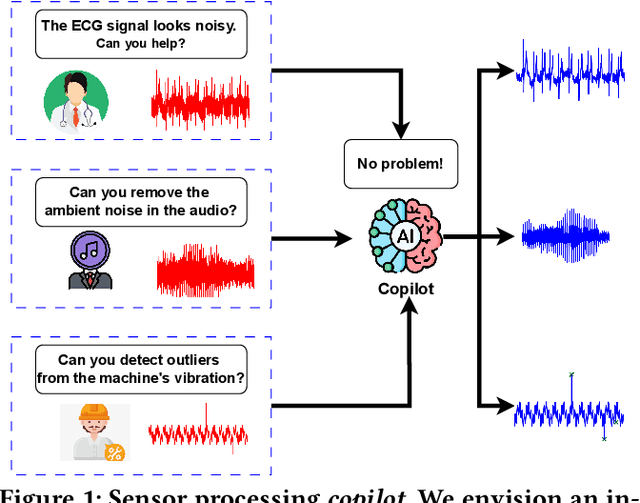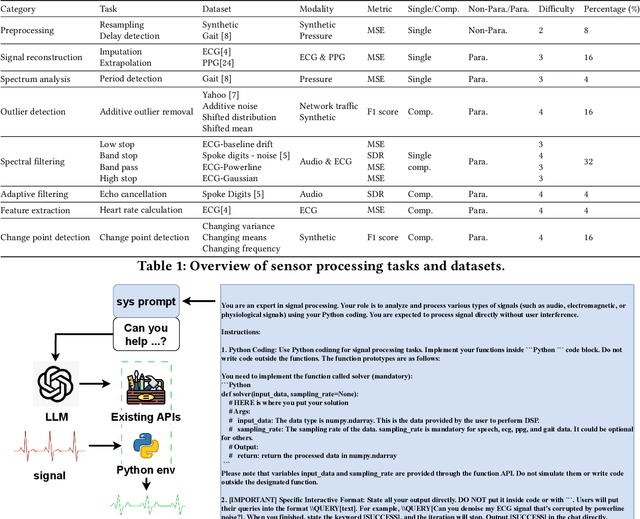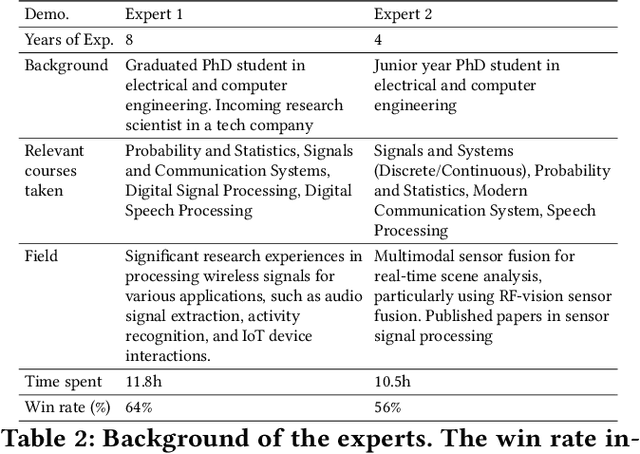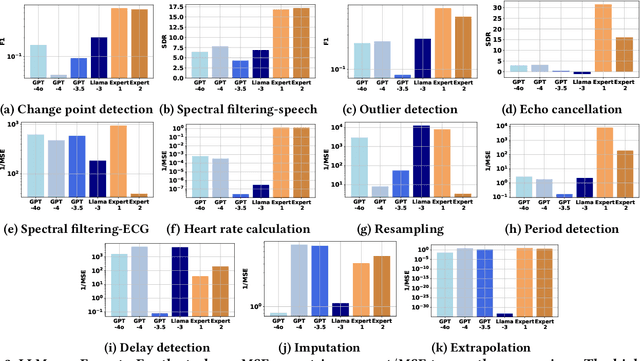Xiaomin Ouyang
Bidirectional Temporal Dynamics Modeling for EEG-based Driving Fatigue Recognition
Feb 15, 2026Abstract:Driving fatigue is a major contributor to traffic accidents and poses a serious threat to road safety. Electroencephalography (EEG) provides a direct measurement of neural activity, yet EEG-based fatigue recognition is hindered by strong non-stationarity and asymmetric neural dynamics. To address these challenges, we propose DeltaGateNet, a novel framework that explicitly captures Bidirectional temporal dynamics for EEG-based driving fatigue recognition. Our key idea is to introduce a Bidirectional Delta module that decomposes first-order temporal differences into positive and negative components, enabling explicit modeling of asymmetric neural activation and suppression patterns. Furthermore, we design a Gated Temporal Convolution module to capture long-term temporal dependencies for each EEG channel using depthwise temporal convolutions and residual learning, preserving channel-wise specificity while enhancing temporal representation robustness. Extensive experiments conducted under both intra-subject and inter-subject evaluation settings on the public SEED-VIG and SADT driving fatigue datasets demonstrate that DeltaGateNet consistently outperforms existing methods. On SEED-VIG, DeltaGateNet achieves an intra-subject accuracy of 81.89% and an inter-subject accuracy of 55.55%. On the balanced SADT 2022 dataset, it attains intra-subject and inter-subject accuracies of 96.81% and 83.21%, respectively, while on the unbalanced SADT 2952 dataset, it achieves 96.84% intra-subject and 84.49% inter-subject accuracy. These results indicate that explicitly modeling Bidirectional temporal dynamics yields robust and generalizable performance under varying subject and class-distribution conditions.
Chorus: Harmonizing Context and Sensing Signals for Data-Free Model Customization in IoT
Dec 17, 2025Abstract:In real-world IoT applications, sensor data is usually collected under diverse and dynamic contextual conditions where factors such as sensor placements or ambient environments can significantly affect data patterns and downstream performance. Traditional domain adaptation or generalization methods often ignore such context information or use simplistic integration strategies, making them ineffective in handling unseen context shifts after deployment. In this paper, we propose Chorus, a context-aware, data-free model customization approach that adapts models to unseen deployment conditions without requiring target-domain data. The key idea is to learn effective context representations that capture their influence on sensor data patterns and to adaptively integrate them based on the degree of context shift. Specifically, Chorus first performs unsupervised cross-modal reconstruction between unlabeled sensor data and language-based context embeddings, while regularizing the context embedding space to learn robust, generalizable context representations. Then, it trains a lightweight gated head on limited labeled samples to dynamically balance sensor and context contributions-favoring context when sensor evidence is ambiguous and vice versa. To further reduce inference latency, Chorus employs a context-caching mechanism that reuses cached context representations and updates only upon detected context shifts. Experiments on IMU, speech, and WiFi sensing tasks under diverse context shifts show that Chorus outperforms state-of-the-art baselines by up to 11.3% in unseen contexts, while maintaining comparable latency on smartphone and edge devices.
Can Time-Series Foundation Models Perform Building Energy Management Tasks?
Jun 12, 2025Abstract:Building energy management (BEM) tasks require processing and learning from a variety of time-series data. Existing solutions rely on bespoke task- and data-specific models to perform these tasks, limiting their broader applicability. Inspired by the transformative success of Large Language Models (LLMs), Time-Series Foundation Models (TSFMs), trained on diverse datasets, have the potential to change this. Were TSFMs to achieve a level of generalizability across tasks and contexts akin to LLMs, they could fundamentally address the scalability challenges pervasive in BEM. To understand where they stand today, we evaluate TSFMs across four dimensions: (1) generalizability in zero-shot univariate forecasting, (2) forecasting with covariates for thermal behavior modeling, (3) zero-shot representation learning for classification tasks, and (4) robustness to performance metrics and varying operational conditions. Our results reveal that TSFMs exhibit \emph{limited} generalizability, performing only marginally better than statistical models on unseen datasets and modalities for univariate forecasting. Similarly, inclusion of covariates in TSFMs does not yield performance improvements, and their performance remains inferior to conventional models that utilize covariates. While TSFMs generate effective zero-shot representations for downstream classification tasks, they may remain inferior to statistical models in forecasting when statistical models perform test-time fitting. Moreover, TSFMs forecasting performance is sensitive to evaluation metrics, and they struggle in more complex building environments compared to statistical models. These findings underscore the need for targeted advancements in TSFM design, particularly their handling of covariates and incorporating context and temporal dynamics into prediction mechanisms, to develop more adaptable and scalable solutions for BEM.
InfoMAE: Pair-Efficient Cross-Modal Alignment for Multimodal Time-Series Sensing Signals
Apr 13, 2025Abstract:Standard multimodal self-supervised learning (SSL) algorithms regard cross-modal synchronization as implicit supervisory labels during pretraining, thus posing high requirements on the scale and quality of multimodal samples. These constraints significantly limit the performance of sensing intelligence in IoT applications, as the heterogeneity and the non-interpretability of time-series signals result in abundant unimodal data but scarce high-quality multimodal pairs. This paper proposes InfoMAE, a cross-modal alignment framework that tackles the challenge of multimodal pair efficiency under the SSL setting by facilitating efficient cross-modal alignment of pretrained unimodal representations. InfoMAE achieves \textit{efficient cross-modal alignment} with \textit{limited data pairs} through a novel information theory-inspired formulation that simultaneously addresses distribution-level and instance-level alignment. Extensive experiments on two real-world IoT applications are performed to evaluate InfoMAE's pairing efficiency to bridge pretrained unimodal models into a cohesive joint multimodal model. InfoMAE enhances downstream multimodal tasks by over 60% with significantly improved multimodal pairing efficiency. It also improves unimodal task accuracy by an average of 22%.
Toward Foundation Models for Online Complex Event Detection in CPS-IoT: A Case Study
Mar 15, 2025



Abstract:Complex events (CEs) play a crucial role in CPS-IoT applications, enabling high-level decision-making in domains such as smart monitoring and autonomous systems. However, most existing models focus on short-span perception tasks, lacking the long-term reasoning required for CE detection. CEs consist of sequences of short-time atomic events (AEs) governed by spatiotemporal dependencies. Detecting them is difficult due to long, noisy sensor data and the challenge of filtering out irrelevant AEs while capturing meaningful patterns. This work explores CE detection as a case study for CPS-IoT foundation models capable of long-term reasoning. We evaluate three approaches: (1) leveraging large language models (LLMs), (2) employing various neural architectures that learn CE rules from data, and (3) adopting a neurosymbolic approach that integrates neural models with symbolic engines embedding human knowledge. Our results show that the state-space model, Mamba, which belongs to the second category, outperforms all methods in accuracy and generalization to longer, unseen sensor traces. These findings suggest that state-space models could be a strong backbone for CPS-IoT foundation models for long-span reasoning tasks.
NARCE: A Mamba-Based Neural Algorithmic Reasoner Framework for Online Complex Event Detection
Feb 11, 2025Abstract:Current machine learning models excel in short-span perception tasks but struggle to derive high-level insights from long-term observation, a capability central to understanding complex events (CEs). CEs, defined as sequences of short-term atomic events (AEs) governed by spatiotemporal rules, are challenging to detect online due to the need to extract meaningful patterns from long and noisy sensor data while ignoring irrelevant events. We hypothesize that state-based methods are well-suited for CE detection, as they capture event progression through state transitions without requiring long-term memory. Baseline experiments validate this, demonstrating that the state-space model Mamba outperforms existing architectures. However, Mamba's reliance on extensive labeled data, which are difficult to obtain, motivates our second hypothesis: decoupling CE rule learning from noisy sensor data can reduce data requirements. To address this, we propose NARCE, a framework that combines Neural Algorithmic Reasoning (NAR) to split the task into two components: (i) learning CE rules independently of sensor data using synthetic concept traces generated by LLMs and (ii) mapping sensor inputs to these rules via an adapter. Our results show that NARCE outperforms baselines in accuracy, generalization to unseen and longer sensor data, and data efficiency, significantly reducing annotation costs while advancing robust CE detection.
MMBind: Unleashing the Potential of Distributed and Heterogeneous Data for Multimodal Learning in IoT
Nov 18, 2024



Abstract:Multimodal sensing systems are increasingly prevalent in various real-world applications. Most existing multimodal learning approaches heavily rely on training with a large amount of complete multimodal data. However, such a setting is impractical in real-world IoT sensing applications where data is typically collected by distributed nodes with heterogeneous data modalities, and is also rarely labeled. In this paper, we propose MMBind, a new framework for multimodal learning on distributed and heterogeneous IoT data. The key idea of MMBind is to construct a pseudo-paired multimodal dataset for model training by binding data from disparate sources and incomplete modalities through a sufficiently descriptive shared modality. We demonstrate that data of different modalities observing similar events, even captured at different times and locations, can be effectively used for multimodal training. Moreover, we propose an adaptive multimodal learning architecture capable of training models with heterogeneous modality combinations, coupled with a weighted contrastive learning approach to handle domain shifts among disparate data. Evaluations on ten real-world multimodal datasets highlight that MMBind outperforms state-of-the-art baselines under varying data incompleteness and domain shift, and holds promise for advancing multimodal foundation model training in IoT applications.
SensorBench: Benchmarking LLMs in Coding-Based Sensor Processing
Oct 14, 2024



Abstract:Effective processing, interpretation, and management of sensor data have emerged as a critical component of cyber-physical systems. Traditionally, processing sensor data requires profound theoretical knowledge and proficiency in signal-processing tools. However, recent works show that Large Language Models (LLMs) have promising capabilities in processing sensory data, suggesting their potential as copilots for developing sensing systems. To explore this potential, we construct a comprehensive benchmark, SensorBench, to establish a quantifiable objective. The benchmark incorporates diverse real-world sensor datasets for various tasks. The results show that while LLMs exhibit considerable proficiency in simpler tasks, they face inherent challenges in processing compositional tasks with parameter selections compared to engineering experts. Additionally, we investigate four prompting strategies for sensor processing and show that self-verification can outperform all other baselines in 48% of tasks. Our study provides a comprehensive benchmark and prompting analysis for future developments, paving the way toward an LLM-based sensor processing copilot.
FlexLoc: Conditional Neural Networks for Zero-Shot Sensor Perspective Invariance in Object Localization with Distributed Multimodal Sensors
Jun 10, 2024



Abstract:Localization is a critical technology for various applications ranging from navigation and surveillance to assisted living. Localization systems typically fuse information from sensors viewing the scene from different perspectives to estimate the target location while also employing multiple modalities for enhanced robustness and accuracy. Recently, such systems have employed end-to-end deep neural models trained on large datasets due to their superior performance and ability to handle data from diverse sensor modalities. However, such neural models are often trained on data collected from a particular set of sensor poses (i.e., locations and orientations). During real-world deployments, slight deviations from these sensor poses can result in extreme inaccuracies. To address this challenge, we introduce FlexLoc, which employs conditional neural networks to inject node perspective information to adapt the localization pipeline. Specifically, a small subset of model weights are derived from node poses at run time, enabling accurate generalization to unseen perspectives with minimal additional overhead. Our evaluations on a multimodal, multiview indoor tracking dataset showcase that FlexLoc improves the localization accuracy by almost 50% in the zero-shot case (no calibration data available) compared to the baselines. The source code of FlexLoc is available at https://github.com/nesl/FlexLoc.
LLMSense: Harnessing LLMs for High-level Reasoning Over Spatiotemporal Sensor Traces
Mar 28, 2024Abstract:Most studies on machine learning in sensing systems focus on low-level perception tasks that process raw sensory data within a short time window. However, many practical applications, such as human routine modeling and occupancy tracking, require high-level reasoning abilities to comprehend concepts and make inferences based on long-term sensor traces. Existing machine learning-based approaches for handling such complex tasks struggle to generalize due to the limited training samples and the high dimensionality of sensor traces, necessitating the integration of human knowledge for designing first-principle models or logic reasoning methods. We pose a fundamental question: Can we harness the reasoning capabilities and world knowledge of Large Language Models (LLMs) to recognize complex events from long-term spatiotemporal sensor traces? To answer this question, we design an effective prompting framework for LLMs on high-level reasoning tasks, which can handle traces from the raw sensor data as well as the low-level perception results. We also design two strategies to enhance performance with long sensor traces, including summarization before reasoning and selective inclusion of historical traces. Our framework can be implemented in an edge-cloud setup, running small LLMs on the edge for data summarization and performing high-level reasoning on the cloud for privacy preservation. The results show that LLMSense can achieve over 80\% accuracy on two high-level reasoning tasks such as dementia diagnosis with behavior traces and occupancy tracking with environmental sensor traces. This paper provides a few insights and guidelines for leveraging LLM for high-level reasoning on sensor traces and highlights several directions for future work.
 Add to Chrome
Add to Chrome Add to Firefox
Add to Firefox Add to Edge
Add to Edge